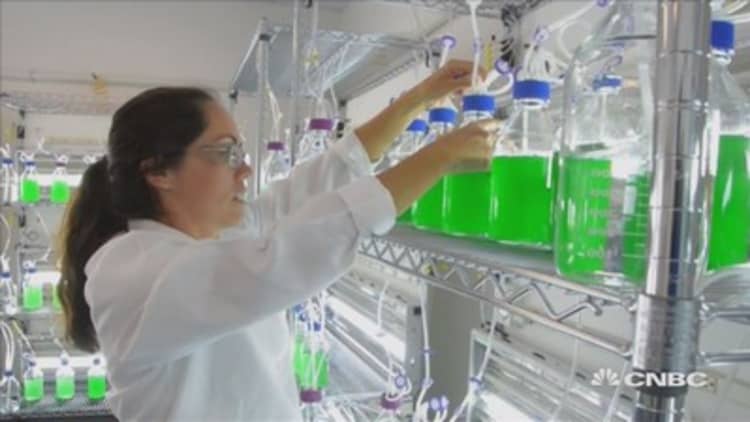
It might be the bane of pools, lakes and rivers across the world, but for one Florida-based company, algae could be the next big thing when it comes to clean energy.
Scientist and engineers at Algenol believe that their patented technology will enable the production of ethanol, gasoline, diesel and jet fuel for just $1.30 per gallon, at annual production levels of 8,000 total gallons of liquid fuel per acre.
Read MoreHow fermentation can turn plants into plastic
"In college, somebody actually said to me, 'ethanol's going to be the fuel of the future, and if we can make it well and cheaply it will be a really good substitute for gasoline one day,'" Paul Woods, founder and CEO of Algenol, told CNBC's Sustainable Energy.
"About three weeks later… I had an epiphany, [an] idea of how to do it," Woods said. "Right now we take sugars from grapes and all kinds of things and convert it into ethanol. But the fastest sugar producer is actually algae."
The process developed by Algenol, based in Fort Myers, uses "enhanced blue-green algae" and photosynthesis to convert carbon dioxide and seawater into sugar, which is then converted into ethanol and biomass.
"What makes these algae very special is they're extraordinarily fast at using photosynthesis to convert carbon dioxide, salt water and sunshine into sugars," Woods said. "It does that about 50 times faster than the terrestrial normal plants we use to make ethanol."
The importance of biofuels is set to increase. The International Energy Agency projects that by 2050, biofuels could provide 27 percent of the world's transportation fuel.
A key component of Algenol's process is the use of flexible, plastic film modular bags called photobioreactors, which use light to carry out chemical processes from organisms or substances derived from organisms.
The step-by-step nature of the process and the ease with which it can be scaled up is key.
Read MoreWave-powered drones map the world's oceans
"Using algae to make biofuels is way better than using corn or sugar, because you're not competing with really valuable food resources for people," Woods said.
"You're also not using valuable agricultural land. Here we grow this algae in saltwater, so again, you're not competing with fresh water," he added. "At the end of this process we actually make fresh water, we don't use it to produce the biofuel."




